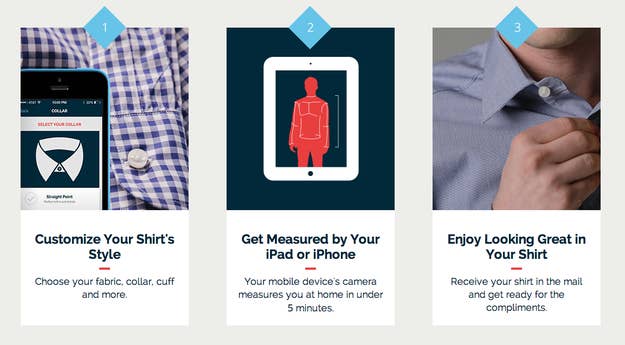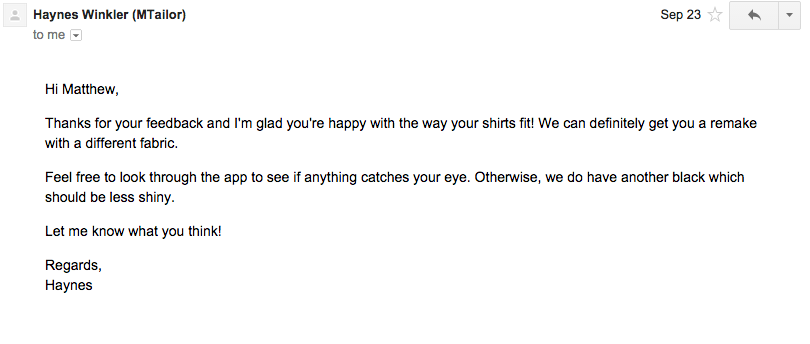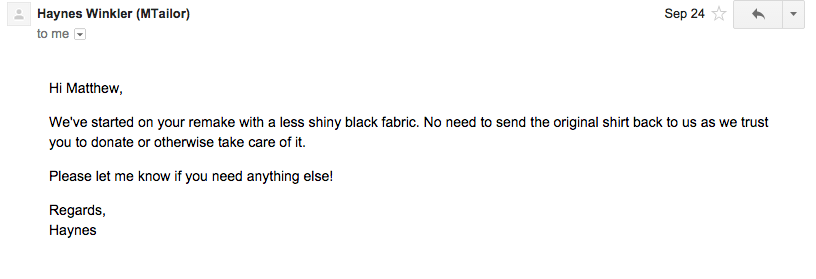
I'm not the type of person who likes shopping, much less trying things on. In fact, I really hate it — the stores stress me out and it is hard to find shirts that fit well.
That's why, when I heard about MTailor through a friend in Silicon Valley, I was intrigued by the prospect. It's surprisingly simple — the app uses an iPhone or iPad camera to scan your body and get your exact measurements. Then you can buy fitted shirts for about the same cost as getting them through a tailor, starting at around $64.
The shirts aren't necessarily very cheap, but compared to a similar costing shirt you might buy at Macy's the quality is exceptionally high. In about three weeks after doing the scan — which involves the kind of awkward procedure of wearing tight-fitting clothing and holding your arms up while spinning slowly in front of a camera — I received my first shirt.
It was awesome.
It was, actually, the first "fitted" shirt I had ever purchased, and after buying the shirt I went ahead and bought another two. I don't believe I will be buying any more shirts outside of those I purchase from MTailor for the foreseeable future.
The shirts are very comfortable. The fabric, which feels a little bit thinner than a normal shirt like a Ralph Lauren-branded shirt, still seems to hold up very well and feel very good. The cut fits neatly around your chest and waist without feeling too tight. The collar, too, feels just the right size, and the sleeves feel like they are fit to the contours of your muscles. They are also easily roll up and fit around sweaters without feeling baggy or loose, which is a problem with some shirts.
There are also a lot of options for what kind of shirt to buy. There's a very large array of fabrics and patterns you can buy, but in reality the company can make any kind of shirt, CEO Miles Penn told BuzzFeed News in an interview detailing the new funding round for the company. In those situations, most customers email with the exact specifications of the shirt, and the company is able to make them. The shirts can be customized to be worn in formal settings — like a white formal shirt for a wedding, for example — or more casually untucked.
The turnaround time is somewhat long, but the company sends you emails along the way as the shirt is being produced, and MTailor's new funding is going to in part try to shorten that delay. The goal, Penn said, is to make the turnaround time as fast as Amazon Prime.

Penn also said that customer experience is one of the most important things that MTailor is trying to be good at. I had a run-in with this when I purchased a black shirt that, when I received it, was a little to shiny for my tastes. I sent some feedback to the team and within a few hours the company said it was making and sending a shirt that would have fabric that is less shiny. MTailor encourages its customers to ask for re-made shirts if they aren't satisfied because it helps improve the algorithm over time.
For example, Penn said, initially slim-fitting shirts were a little too baggy around the waist. Several people complained about this, and over time the company made the waist fit more neatly. When I purchased the shirt, I assume it was after the changes had been made, because the waist fit well and still was not too tight.
A process like this, too, should save a lot of time. Instead of having to go to a store and find other shirts that fit, I was able to quickly order another two shirts through the app using my existing measurements when I wanted new shirts. That saved not only the process of flipping through racks at a store, but also travel to and from the store and dealing with the typical crowds of downtown San Francisco. The experience should theoretically be the same for everyone who uses the app.


There's a natural appeal to an application like this beyond Silicon Valley. After all, everyone (theoretically) wears shirts. I am not one to typically focus on style and fashion, but after purchasing the shirts, I can't help but feel tapped into some cultural vein that I had otherwise ignored for most of my time. After all, in Silicon Valley, the typical uniform is jeans, a startup-branded shirt, and probably a hoodie to deal with the evening chilly temperatures.
MTailor, too, is a rare company in Silicon Valley that is actually generating real revenues because it is selling something. While many are criticizing startups for signing huge leases for offices and burning through cash with products that make no money, MTailor is still renting a small corner of an existing startup's office in a less-populated part of San Francisco and selling actual products.
The downside of this is that if your body shape changes then you will have to be re-measured and then buy new shirts. But that's basically the same experience as something you would have to do when buying a new shirt at a department store — except without the process of going to the store and trying on multiple shirts.
There is also a question of whether the shirts can survive in the long run, which will be a test of quality. However, I purchased my first shirt in July and have worn it more than a dozen times since it arrived, and the shirt is still in very good condition. It's machine washable, which makes it much easier to manage, and the shirts largely come out wrinkle-free after running through a typical dryer.
The next step for the company, Penn said, is likely to expand into pants. This won't take much of a change to the algorithms as the company already has your body measurements from the initial video. The company stores a 3D model of you, and then deletes the video where it takes the measurements, and Penn says there is nothing identifying about the 3D model. He said the reason the company has focused solely on shirts is because they want to make the "perfect" shirt, not a "pretty good" shirt.
While it's hard to judge whether it's "perfect" — there are a lot of shirts out in the world — it's very, very good. And if the quality of the shirts is any indicator of the future quality of other articles of clothing, it's going to see quite a few more purchases from me.
